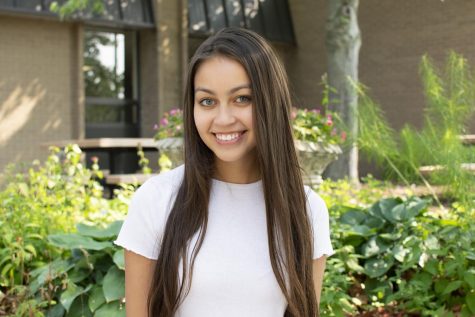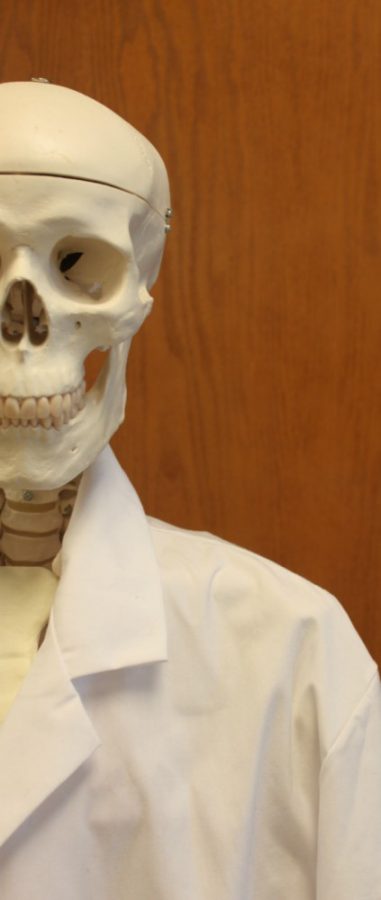More than Medicine
Club provides medical field experience
Whether it was for a broken bone or a yearly checkup, everyone has gone to the doctors once in their life. The people who tend to your flu shots and fill your cavities are all a part of the health science field. These adults have the same driving passion, and for some, it all began when they were students.
Medical Science club is open to all students who have an interest in learning about the human body, or students who want to pursue an occupation in the medical field. The club encompasses occupations from bio medical engineers to dentists, not just physicians or surgeons, Sharon Price, club sponsor, said.
“This club is so unique. I don’t think many other clubs can do what we do,” Michael Pardun, senior, said. “Members are just dedicated and motivated to deepen their interest levels in becoming a doctor and the community outreach is definitely important as well. That’s what separates us from other clubs, it is just the fun aspect that people like.”
While this club encompasses students who are passionate about the medical field, a big part of the fun aspect is the community outreach and the aspect of helping out in the school, Pardun said.
“We volunteer at different events that promote community help and even just promoting community help at our school serves a benefit for the students,” Daniel Kraversky, senior, said. “Other clubs that do volunteering just volunteer to help other people out, whereas when we volunteer we actually volunteer to bring awareness of different health conditions and help the community be healthy in general.”
While focusing on helping the community through 5K runs for Breast Cancer Awareness or at Feed my Starving Children, members of the club are also given the opportunity to experience the medical field early on.
“[The club] gives students real world experiences outside of the classroom because they will never be able to experience it without applying for an internship or going to the doctors,” Brian Gorke, senior vice President, said. “People can explore what they want to do now, so they are not just going in blind.”
Through Medical Science club, Kraversky was given the real world experience to be a camp counselor at the Muscular Dystrophy Association summer camp. This six day overnight camp allowed Kraversky to work with children who have a disease that causes muscle loss and weakness and solidified his passion for medicine, Kraversky said.
“Most kids with muscular dystrophy have a hard time swimming because their muscles are so weak and I thought it was great that they had this pool and allowed kids to do what they normally would not do at home, because it showed their independence and freedom,” Kraversky said. “It was special to me because my camper felt like he was at home. There were a ton of other kids with muscular dystrophy there and he didn’t feel any different than anyone else which is what was important.”
Working with these kids changed Kraversky’s mindset and allowed him to see from a different point of view, proving how Medical Science club creates unique experiences for students, Kraversky said.
“It is hard to imagine what it would be like without being able to use your arms and legs well,” Kraversky said. “I had to do everything for my camper, I had to change him, bathe him, and help him go to the bathroom. It doesn’t make you take life lightly. You just realize how important your life is.”
Providing experience for students is not the only thing that the club offers. Every month, a guest speaker comes to talk with students about their jobs. The club’s goal is to bring medical topics into the hands of students, according to the mission statement.
“[The speakers] give us tips and guidelines for students to grow in the medical field and school,” Andrew Rifkin, senior president, said. “[We learned] language is a really big quality to have when interacting with patients. Having compassion is also a big part that we talk about, by being able to understand what patients are going through.”
Medical Science club allows the many students invested in the field to grow in their interest, but the club also is a way for any student to learn more about themselves, Price said.
“I really think students should join whether or not they are interested in something that is medical or health career based. Even if you do not want to pursue a career in it, it can help educate you,” Price said. “If you have to go to the doctors and they explain something to you, you better understand what they are saying so you can ask the proper questions and make the right choices for yourself.”

Along with being Editor-in-Chief of the Bear Facts magazine, Chloe is involved with Yearbook, Student Leadership, Student Council, SNAP, and Interact....

